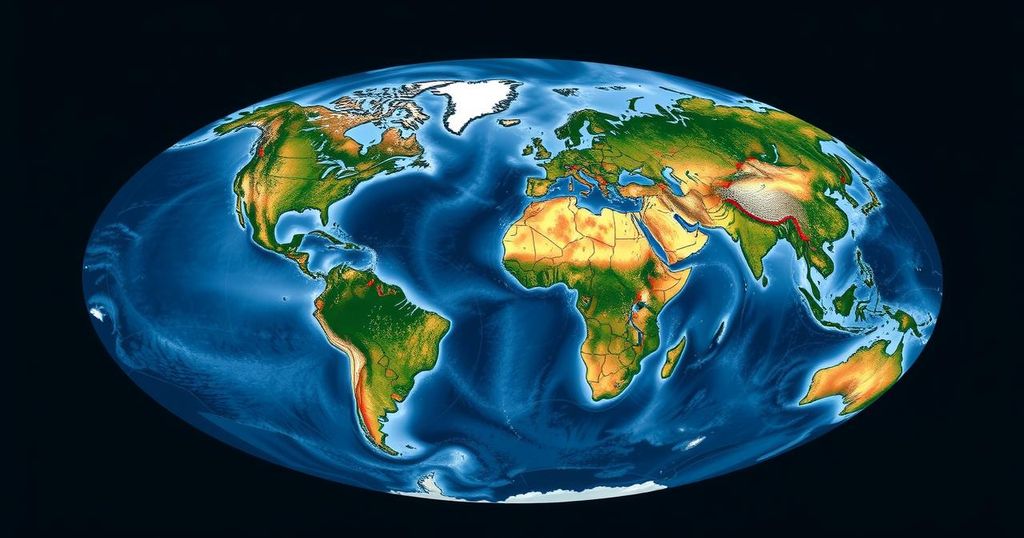A study utilizing NASA and German satellite data has revealed a significant decline in global freshwater supplies since 2014, suggesting a lasting drier period due to climate change. The drop totals 290 cubic miles lower than pre-2015 levels, raising concerns over increasing reliance on groundwater and the consequent societal risks such as famine and conflicts. The findings emphasize a pressing need for strategic water management amidst changing climatic conditions.
An international consortium of scientists has observed a significant decrease in the Earth’s freshwater supply, commencing in May 2014, as revealed by satellite data from NASA and Germany. The findings, published in the journal Surveys in Geophysics, indicate that from 2015 to 2023, freshwater reserves—encompassing lakes, rivers, and groundwater—diminished by 290 cubic miles (1,200 cubic kilometers) relative to the 2002-2014 average. NASA hydrologist Matthew Rodell stated that this loss equates to 2.5 times the volume of Lake Erie. The study attributes this decline to a series of extended droughts, particularly exacerbated by increasing reliance on groundwater for irrigation in agriculture and urban settings. This trend creates a cyclical problem of dwindling freshwater resources, where insufficient rainfall fails to replenish supplies, prompting further groundwater extraction. This situation leads to significant water scarcity, threatening communities and agricultural systems, which increases the risk of famine, conflict, poverty, and disease due to reliance on contaminated water sources, as highlighted by a 2024 UN report. Monitoring of freshwater changes was conducted using data from the Gravity Recovery and Climate Experiment (GRACE) satellites, which track Earth’s gravitational variances indicating shifts in water mass. The GRACE satellites’ initial phase lasted from 2002 to 2017, and the current GRACE-Follow On (GRACE-FO) satellites, deployed in 2018, continue this vital observation. Notably, the freshwater decline first manifested during extreme drought conditions in Brazil, later spreading to regions across Australasia, South America, North America, Europe, and Africa. The phenomenon is correlated with elevated ocean temperatures in the tropical Pacific, which disrupted global rainfall patterns due to the El Niño event from 2014 to 2016. Despite the decline in intensity of El Niño following 2016, global freshwater levels have not rebounded, with 13 of the 30 most severe droughts recorded by GRACE satellites occurring after 2015. Climate change is suspected as a critical driver of this continued depletion. NASA meteorologist Michael Bosilovich notes that higher atmospheric temperatures lead to increased moisture retention and heightened evaporation rates, compounding drought conditions. He explained how extreme rainfall events are becoming less effective at replenishing groundwater, stating, “When there’s extreme precipitation, the water tends to run off rather than soak into the ground.” While there are mounting indications linking the freshwater decline to climate change, experts such as hydrologist Susanna Werth from Virginia Tech emphasize the challenges of establishing a direct correlation, citing uncertainties surrounding climate models. The future of global freshwater levels remains uncertain, raising questions about whether they will stabilize, recover to pre-2015 levels, or continue to decline. Rodell expressed concerns that the trend might indeed signify the onset of prolonged water stress, reflecting on the coinciding pattern of warmer years with this decline.
The article discusses critical research outcomes indicating a sharp decrease in global freshwater supplies, emphasizing data collected by NASA and German satellites since 2014. The declining freshwater resources, crucial for community sustenance, agriculture, and overall ecological health, reflect significant environmental challenges driven by climatic shifts. With extreme droughts becoming increasingly threatening, this analysis elucidates the ongoing repercussions of climate change on water availability, societal stability, and agricultural productivity.
The alarming findings of this study underscore the increasing threat of climate change on global freshwater reserves, advocating for urgent attention to water management practices. With the ongoing depletion of freshwater supplies, communities face dire consequences including famine and disease, underscoring the need for effective strategies to combat water scarcity. Future research is essential to understand the complexities of this situation and develop long-term solutions to ensure sustainable freshwater availability for upcoming generations.
Original Source: www.businesstoday.in






